On this page
- What are core values in the workplace and why does it matter?
- Step-by-step guide to implementing core values in the workplace
- 7 core values in the workplace with examples of Fortune 500 companies
- How to integrate core values into daily operations?
- Challenges in living core values and how to overcome them
- Leadership’s role in exemplifying core values
- Inspire a purpose-driven workplace culture with Empuls
- Conclusion: Embracing core values for a thriving workplace
- FAQ's
Core values in the workplace play a vital role in shaping company culture, guiding behavior, and aligning teams with shared goals. These foundational beliefs influence how decisions are made, how employees collaborate, and how organizations grow. When values are clearly defined and authentically practiced, they foster trust, accountability, and a sense of purpose.
Companies that prioritize core values not only strengthen employee engagement and retention, but also attract talent that resonates with their mission. In today’s evolving work environment, establishing and living by strong core values is essential to building a resilient, motivated, and high-performing workforce.
Take Southwest Airlines as an example. Southwest Airlines emphasizes a commitment to its employees and customers through its core principles, "The Southwest Way." This includes a focus on serving others, a fun-loving spirit, and integrity.
By prioritizing these values, Southwest Airlines has cultivated a loyal workforce and a dedicated customer base, demonstrating that aligning company culture with core values can lead to significant business success. As organizations navigate the complexities of today’s workforce, understanding and implementing core values becomes increasingly critical for sustainable growth.
What are core values in the workplace and why does it matter?
Core values are a small set of essential, enduring principles encapsulating an organization's culture. They represent the foundational commitments and beliefs that help a company navigate complex situations while maintaining its identity. As Gino Wickham describes, these values dictate how everyone in the organization is expected to operate to succeed. A strong core value can lead towards:
- Decision-making. Core values provide a framework for employees to make decisions that align with the organization's mission and goals. This consistency helps maintain a unified direction across the company.
- Building a cultural foundation. They establish the organization's culture, influencing employee satisfaction and engagement. A strong alignment between personal and organizational values can increase employee morale and retention.
- Attracting talent. Clearly defined core values can attract potential employees who resonate with those principles, enhancing recruitment efforts.
- Fostering connection. In diverse work environments, shared core values create a sense of belonging among employees, fostering teamwork and collaboration.
-> The commitment to core values must start at the top. Gallup's research indicates that only 26% of U.S. employees strongly agree that their company consistently delivers on its promises regarding values.
-> The same study revealed that only 23% of U.S. employees feel they can apply their organization’s values in their work, and only 27% believe in them.
-> Cultures that hold all employees accountable for living the company's values tend to be more successful. Clear communication of expectations and performance management aligned with these values fosters a culture of self-management.
-> According to MIT Sloan Review, More than 75% of CEOs have discussed their company’s culture or core values in interviews, even when not prompted, highlighting the importance leaders place on these concepts.
-> The same study revealed that companies typically list between three to seven core values, with integrity being the most common, cited by 65% of organizations.
-> It also revealed that less than 25% of companies that publish culture statements explain how these values contribute to organizational success. Companies that articulate this connection tend to foster a stronger alignment between employee behavior and corporate goals.
The statistics underscore the importance of core culture in the workplace. Organizations must ensure that their values are clearly defined but also actionable, distinctive, and linked to measurable outcomes to positively impact culture and performance.
Step-by-step guide to implementing core values in the workplace
Embedding organizational core values into the fabric of a company requires more than just writing them down. It takes a thoughtful, strategic approach to ensure these values influence decisions, behaviors, and culture across the organization. Here’s a step-by-step guide on how to promote core values in the workplace and turn them into a driving force for success.
1. Define authentic and actionable core values
Begin by identifying values that genuinely reflect your organization’s mission and vision. Involve leadership and employees in the process to ensure the values resonate at all levels. Effective values in the workplace should be:
- Authentic: True to your company’s identity
- Actionable: Clear enough to guide decisions and behaviors
- Memorable: Simple and compelling so they’re easy to recall
Avoid vague concepts like “integrity” without context. Instead, explain what each value means and how it looks in action.
2. Align leadership behavior with core values
Leaders must model the organizational core values daily. When leadership consistently demonstrates the values through actions—not just words—it sets the tone for the rest of the company.
For example, if “transparency” is a core value, leaders should openly communicate challenges and invite employee feedback. This builds trust and reinforces the desired behaviors.
3. Communicate values consistently and clearly
Communication is key in showing employees how to promote core values in the workplace. Use a variety of channels to reinforce the message:
- Internal newsletters
- Team meetings
- Onboarding materials
- Company intranet or values page
Visual representations, such as posters or screensavers, can also help keep values top-of-mind. Make sure values aren’t just mentioned once and forgotten—repetition is essential for reinforcement.
4. Integrate values into hiring and onboarding
Hiring for culture fit is one of the most effective ways to sustain your values over time. Include your organizational core values in job descriptions and interview questions. During onboarding, explain what the values mean and how they show up in everyday work.
This sets expectations early and helps new employees understand what the company stands for.
5. Embed values in performance management
Link values to performance goals and reviews. Recognize employees who embody the core values through formal rewards, shout-outs, or internal awards. This not only celebrates positive behavior but also motivates others to follow suit.
For example, if “collaboration” is a key value, acknowledge cross-functional efforts that drive results.
6. Encourage peer-to-peer recognition
Empower employees to recognize each other for living the values. Peer recognition platforms, team shoutouts, or value-based kudos can make a big impact. This builds a culture where values aren’t imposed top-down but embraced at every level.
7. Revisit and refine values over time
As your company grows, your core values might evolve. Schedule periodic reviews with leadership and employees to assess whether the current values still reflect your culture and goals. Adjustments may be necessary to stay aligned with shifting priorities or organizational changes.
7 core values in the workplace with examples of Fortune 500 companies
Core values in the workplace are essential principles that guide an organization's actions and culture. Here are some key examples of core values, including specific areas such as Diversity, Equity, and Inclusion (DEI), Sustainability, and Customer Focus, and examples of companies that exemplify these values.
1. Integrity
Integrity is crucial for building a credible and trustworthy workplace. It encompasses ethical behavior, honesty, and transparency in all actions. Employees who embody integrity are more likely to earn the respect of their peers and clients, creating a positive atmosphere conducive to collaboration and innovation. Organizations prioritizing integrity often see improved employee morale and a stronger reputation in the marketplace as they align their practices with their values.
Patagonia's core value of integrity is deeply embedded in its business practices and corporate social responsibility efforts. The company recognizes that it does not own the factories producing its products, which presents unique challenges in ensuring ethical labor practices.
To address this, Patagonia employs a rigorous "4-Fold" vetting approach when selecting factories, evaluating social and environmental practices alongside quality and financial stability. This commitment to integrity also extends to its employee treatment; Patagonia ensures fair wages and benefits for its nearly 2,000 employees while actively working to improve conditions for workers in its supply chain.
The company has established partnerships with organizations like the Fair Labor Association to uphold high social compliance and transparency standards, illustrating their belief that "you can’t make good products in a bad factory."
Through initiatives like The Footprint Chronicles, Patagonia transparently shares its products' social and environmental impacts, reinforcing its dedication to integrity in all aspects of its operation.
2. Innovation
Innovation is a core value that encourages creativity and continuous improvement within an organization. Companies can stay competitive and responsive to changing market demands by fostering an environment where new ideas are welcomed, and experimentation is encouraged. This value drives product development and enhances employee engagement, as team members feel motivated to contribute their unique perspectives and solutions.
Apple’s core value of innovation is deeply embedded in its organizational structure and culture, which has evolved significantly since Steve Jobs's return in 1997. Rejecting conventional management practices that hindered creativity, Jobs restructured the company by eliminating separate business units and consolidating operations under a single profit and loss statement.
This unique approach fosters collaboration across various functional areas, enabling teams to collaborate seamlessly on product development. As a result, Apple has consistently delivered groundbreaking hardware, software, and services, driving its remarkable growth from $7 billion in revenue to $260 billion in just over two decades.
This commitment to innovation fuels Apple's product pipeline and positions the company as a leader in rapidly changing technological landscapes, demonstrating how organizational design can enhance creative output and adaptability in a competitive market.
3. Accountability
Workplace accountability refers to employees' commitment to take ownership of their actions and decisions. It fosters a culture where individuals are answerable for their performance, leading to increased trust and morale among team members. When accountability is prioritized, employees feel empowered to admit mistakes and learn from them, which enhances overall productivity and teamwork.
Netflix's core value of accountability is fundamental to its unique corporate culture, emphasizing personal responsibility and ownership among employees. This value encourages team members to make informed decisions and take risks while being accountable for the outcomes of those decisions.
At Netflix, accountability is not just about individual performance; it extends to fostering a culture where employees support one another in achieving collective goals. The company promotes open communication and candid feedback, allowing individuals to learn from mistakes and share insights widely.
This approach drives innovation and ensures everyone is aligned with the company's mission to entertain the world effectively. By valuing accountability, Netflix creates an environment where employees feel empowered to contribute their best work without the constraints of excessive rules or bureaucracy, ultimately enhancing overall performance and creativity.
4. Respect
Respect is essential for cultivating a positive workplace culture. It involves treating all individuals with dignity and fairness, regardless of their position or background. A respectful environment encourages open dialogue, enhances employee satisfaction, and promotes teamwork. Companies that emphasize respect often experience lower turnover rates and higher levels of engagement, as employees feel valued and understood.
Google's core value of respect is integral to its workplace culture, emphasizing the importance of psychological safety and open communication among employees. Through initiatives like Project Aristotle, Google discovered that successful collaboration hinges on creating an environment where team members feel safe to express their thoughts and ideas without fear of embarrassment or rejection.
This respect manifests in ensuring equal participation in discussions, fostering empathy among colleagues, and cultivating a culture that values diverse perspectives. By prioritizing respect, Google enhances team morale and drives innovation and productivity, demonstrating that a supportive workplace culture is essential for achieving high performance and effective collaboration.
5. Customer focus
Customer focus emphasizes the importance of understanding and meeting the needs of clients. This core value drives employees to prioritize customer satisfaction in all interactions, ensuring their services or products align with customer expectations.
Organizations that adopt a customer-centric approach often see improved loyalty and retention rates as they actively seek feedback to enhance their offerings. By cultivating a culture that values customer input, businesses can foster long-lasting relationships and build a strong brand reputation.
Amazon's core value of customer focus is deeply embedded in its operational philosophy, often called "customer obsession." This approach prioritizes understanding and anticipating customer needs, ensuring that every aspect of the business is aligned with enhancing the customer experience.
Amazon invests significantly in data analysis to gain insights into customer preferences and behaviors, which informs product development and service improvements. The company's leadership actively engages with customer feedback, fostering a culture of continuous improvement and innovation.
By committing to long-term customer satisfaction rather than short-term profits, Amazon has built a loyal customer base and established itself as a leader in the e-commerce space. This relentless focus on delivering exceptional value and personalized experiences has become a hallmark of Amazon's success, allowing it to thrive in a competitive market.
6. Diversity, equity, and inclusion (DEI)
Diversity, Equity, and Inclusion (DEI) are essential values that promote a workplace culture where all individuals feel respected, valued, and supported. Embracing DEI means actively working to create an environment that welcomes diverse perspectives and backgrounds, which can lead to enhanced creativity and innovation.
Organizations prioritizing DEI improve employee satisfaction and enhance their reputation in the marketplace by demonstrating a commitment to social responsibility and fairness.
Ampersand strongly emphasizes Diversity, Equity, and Inclusion (DEI) as a core value, recognizing that each company has unique DEI needs. Under the leadership of Ayannah Johnson, the Senior Director of DEI and Employment Experience, Ampersand tailors its initiatives to address specific challenges and opportunities within the organization.
This approach has led to meaningful changes, such as expanding healthcare and parental leave policies to be more inclusive, particularly in response to employee feedback, including those from marginalized communities.
Additionally, Ampersand fosters a culture of open dialogue, exemplified by a conversation initiated by a trans employee that further informed their strategic DEI plan. Through these efforts, Ampersand advocates for diverse candidates and values their unique contributions to the company.
7. Sustainability
Sustainability as a core value reflects an organization's commitment to environmental stewardship and responsible resource management. Companies prioritizing sustainability aim to minimize their ecological footprint while promoting practices that benefit society.
This includes initiatives such as reducing waste, conserving energy, and supporting ethical sourcing practices. By embedding sustainability into their operational strategies, organizations can contribute positively to the environment and appeal to environmentally-conscious consumers, enhancing their market competitiveness.
Unilever's core value of Sustainability is central to its business strategy, encapsulated in "The Unilever Sustainable Living Plan," launched in 2010. This initiative aims to double the size of the business while simultaneously reducing its environmental footprint and enhancing social impact.
Unilever is committed to sustainably sourcing all agricultural raw materials and has set ambitious targets, such as helping over a billion people improve their health and well-being. The company recognizes that achieving these goals requires strong partnerships with suppliers, so it established the "Partner to Win" program.
These do seem recommendable. But how do we integrate such practices by Fortune 500 companies? Integrate them in daily tasks.
How to integrate core values into daily operations?
This initiative fosters collaborative relationships with key suppliers, ensuring that sustainability is integrated throughout the supply chain, thus driving innovation and responsible sourcing practices that align with Unilever's broader sustainability objectives.
These core values shape organizational culture and influence employee engagement, customer satisfaction, and overall business success.
Here are practical ways to ensure your core values influence all aspects of business:
- Hiring: Infuse values into job descriptions, interview questions, and onboarding. Candidates should understand what your organization stands for from day one.
- Recognition: Acknowledge and reward employees who consistently demonstrate your values. Link performance reviews to behaviors that reflect those values.
- Leadership and management: Train leaders to model and reinforce core values. Managers should embody them in their language, feedback, and decisions.
- Decision-making: Use core values as a compass in ethical dilemmas and business strategies. This helps align actions with intentions, even in complex scenarios.
- Training and development: Embed core values into learning programs, leadership development, and mentorship initiatives to reinforce cultural alignment over time.
- Community contributions: Encourage employees to participate in community activities that reflect company values. For instance, Deloitte’s “Impact Day” is an embodiment of its value “Making an Impact that Matters.”
- Continuous assessment: Regularly evaluate how well values are being lived through surveys or focus groups. Tools like Great Place To Work’s engagement survey help identify gaps and opportunities.
This level of integration ensures that your values in the workplace don’t remain abstract ideals but become the lens through which every action is evaluated.
Challenges in living core values and how to overcome them
While many organizations invest in defining strong core values, sustaining them can be a challenge — especially if there’s limited buy-in from leadership or inconsistency between stated values and actual behaviors.
Consider this: your company declares integrity as a core value, promising to prioritize ethics over personal gain. Yet, if a sales team routinely overpromises to close deals — and leadership overlooks it due to high revenue — employees will quickly lose trust. This contradiction erodes morale, credibility, and long-term performance.
- Values may feel irrelevant to daily operations or employee roles.
- They might lack emotional resonance or be too generic to inspire action.
- Communication of values is sporadic or unclear.
- Leadership isn’t held accountable for modeling those values.
According to Great Place To Work, when employees trust leadership and find purpose in their work, it leads to higher retention and even stronger financial performance. To maintain alignment, leaders must evaluate the root causes of value disconnects and realign strategies accordingly.
By re-examining your organizational core values and ensuring they are emotionally compelling, consistently communicated, and visibly practiced, you can close the gap between what’s said and what’s done.
Leadership’s role in exemplifying core values
Leadership sets the tone for how organizational core values are perceived and lived. Even the most well-defined values in the workplace will fall flat if leaders do not consistently demonstrate them in words and actions.
- Keep values visible: Talk about values during team meetings, strategic planning, and performance reviews. Celebrate when hard decisions are made to uphold values — for example, when a team delays a product launch to maintain quality, highlight that as living your value of excellence.
- Own mistakes openly: When leaders fall short, transparency matters. Admitting to missteps — such as failing to listen or acting counter to a stated value — builds trust and reinforces accountability.
- Build systems that reflect values: Create structures that promote value-based behavior. If innovation is a core value, allocate time for brainstorming and experimentation. If empathy matters, include it in leadership training and peer evaluations.
- Make values a promotion criterion: Ensure that advancement is based not only on results but also on how those results are achieved. A high-performing manager who violates company values should not be rewarded at the expense of culture.
Strong leadership ensures that core values are more than symbolic — they become the standard for behavior, decision-making, and recognition across the organization.
Inspire a purpose-driven workplace culture with Empuls
Empuls offers a suite of tools—powered by AI, automation, and integrated engagement features—that make it easy to embed core values into the everyday work experience. Here's how you can translate theory into practice:
1. Define and reinforce core values through recognition
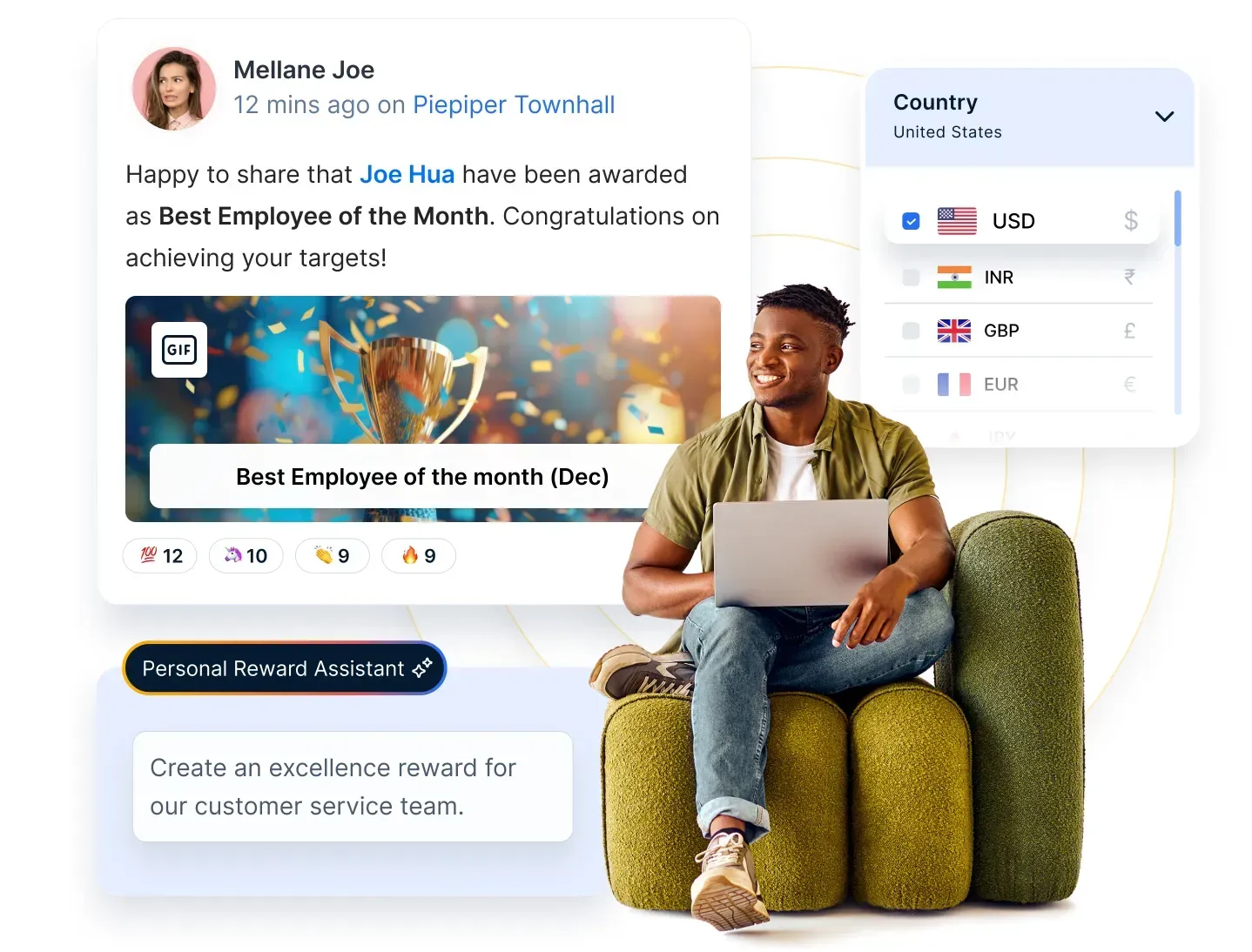
Use Empuls Features:
- Core Value Badges: Attach company values to peer-to-peer recognition and awards.
- Spot & Nomination Awards: Recognize behavior aligned with values like integrity, innovation, or teamwork.
- AI Nudges from Em: Prompt employees to log weekly achievements that reflect core values, helping managers identify value-aligned behaviors for real-time recognition.
Example: Highlight a team that embodies “Innovation” through a jury-nominated quarterly award, shared on the Wall of Fame.
2. Drive awareness with a social intranet

Use Empuls Social Intranet:
- Share stories of employees demonstrating core values.
- Use Townhall, AMAs, Posts, Polls, and Videos to reinforce values like transparency and respect.
- Promote two-way conversations about values through comments, reactions, and team forums.
Example: Post a weekly spotlight on employees embodying “Customer Obsession” with a video + peer shoutouts.
3. Embed values in surveys and feedback
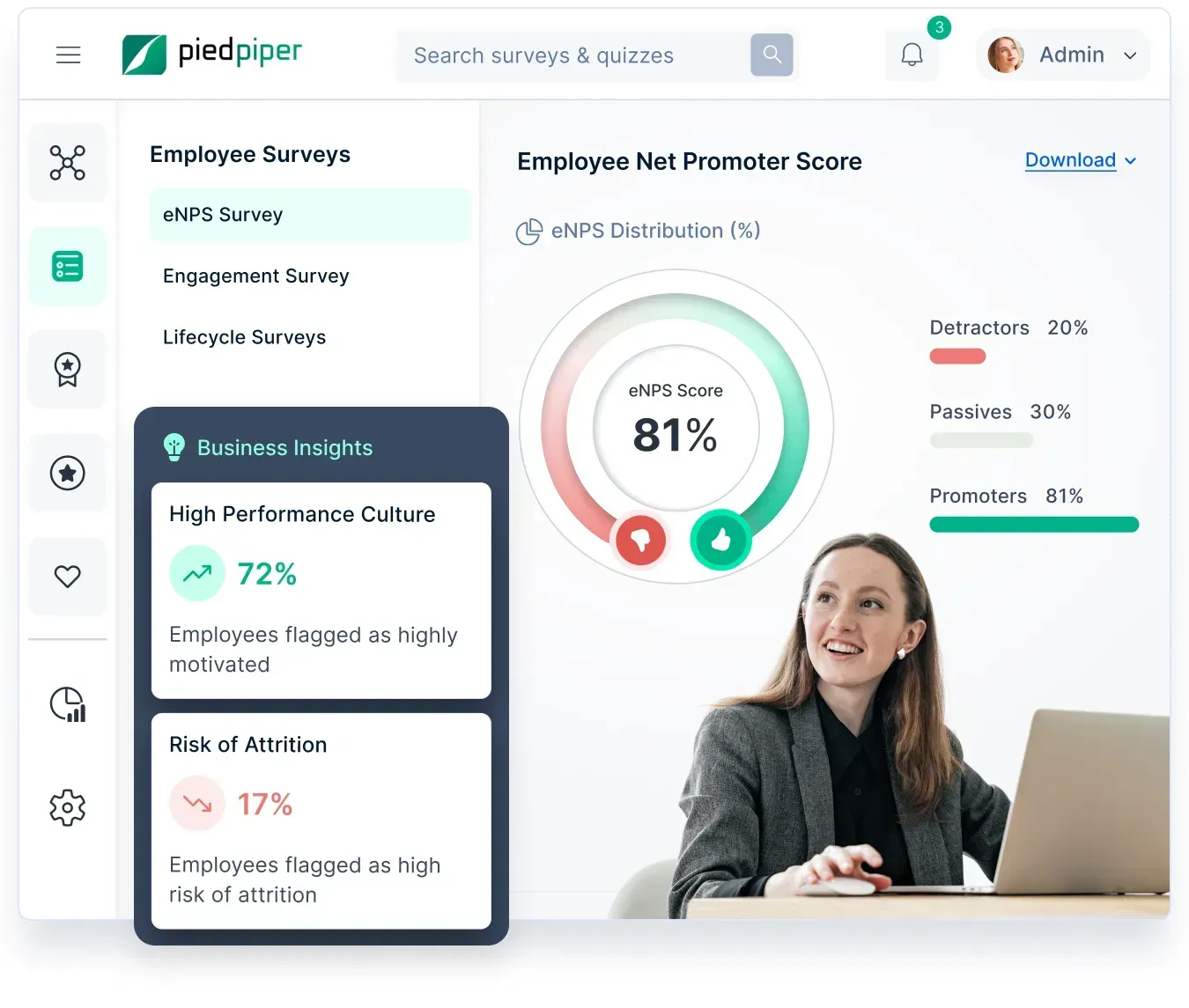
Use Empuls Survey Suite:
- Include questions that measure alignment with values in eNPS, pulse, and lifecycle surveys.
- Get AI-generated insights and sentiment analysis to assess cultural fit and behavioral trends.
Example: Use a 360° feedback survey to evaluate how well team leads model “Accountability” or “Empathy.”
4. Celebrate milestones that reflect values
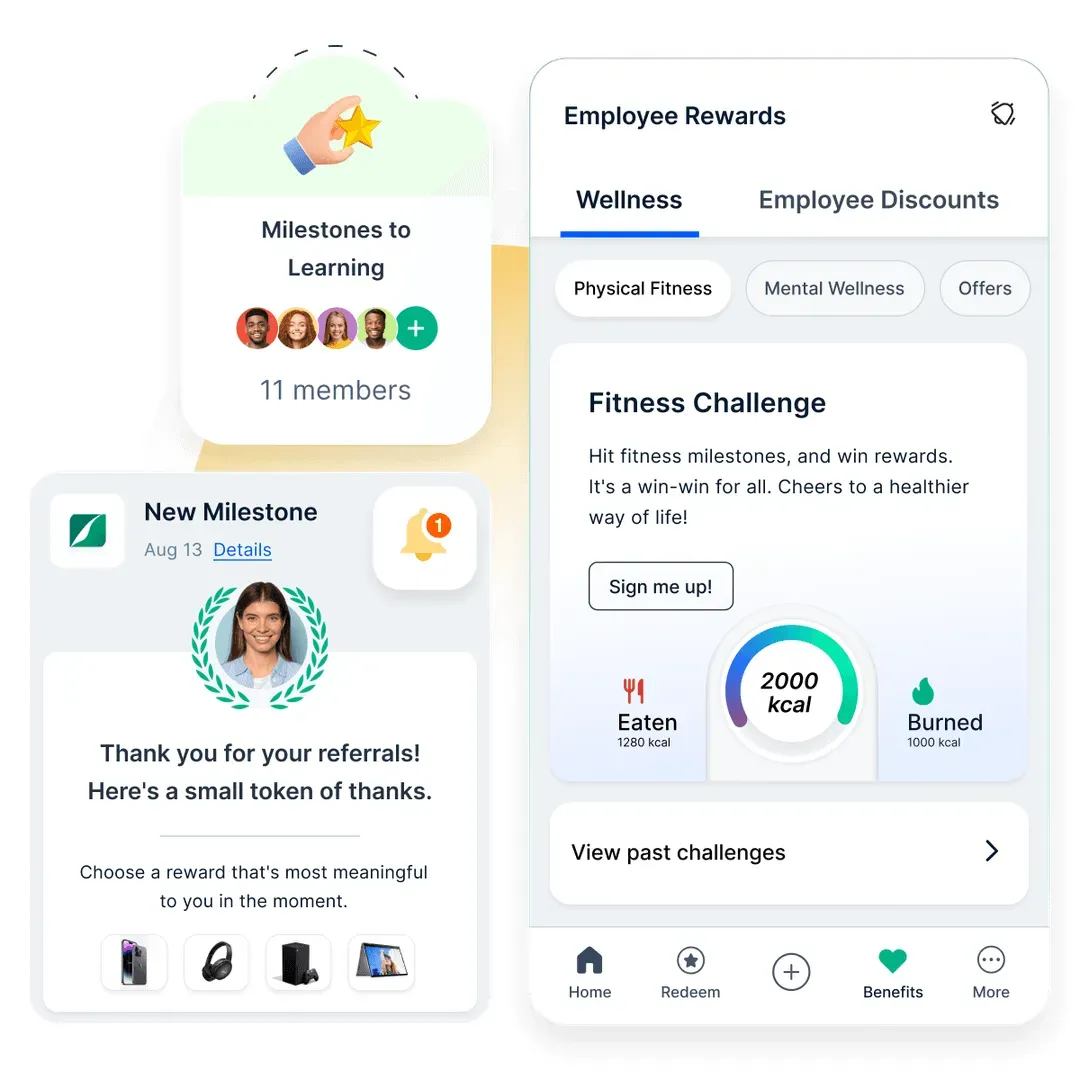
Use Empuls Milestones & Service Awards:
- Automate celebrations tied to service anniversaries and career achievements using value-aligned themes.
- Publish them to the Wall of Fame and wishboards for org-wide visibility.
Example: Celebrate a 10-year service anniversary by highlighting how the employee lived the value of “Integrity” through a personalized yearbook.
5. Gamify value-driven challenges

Use Empuls Challenges & Leaderboards:
- Create contests that reflect DEI, Sustainability, or Collaboration values.
- Reward top performers with points, badges, and custom swag.
Example: Run a “Sustainability Week” challenge encouraging green practices, with winners celebrated on TV mode of the Wall of Fame.
6. Infuse values into hiring & onboarding
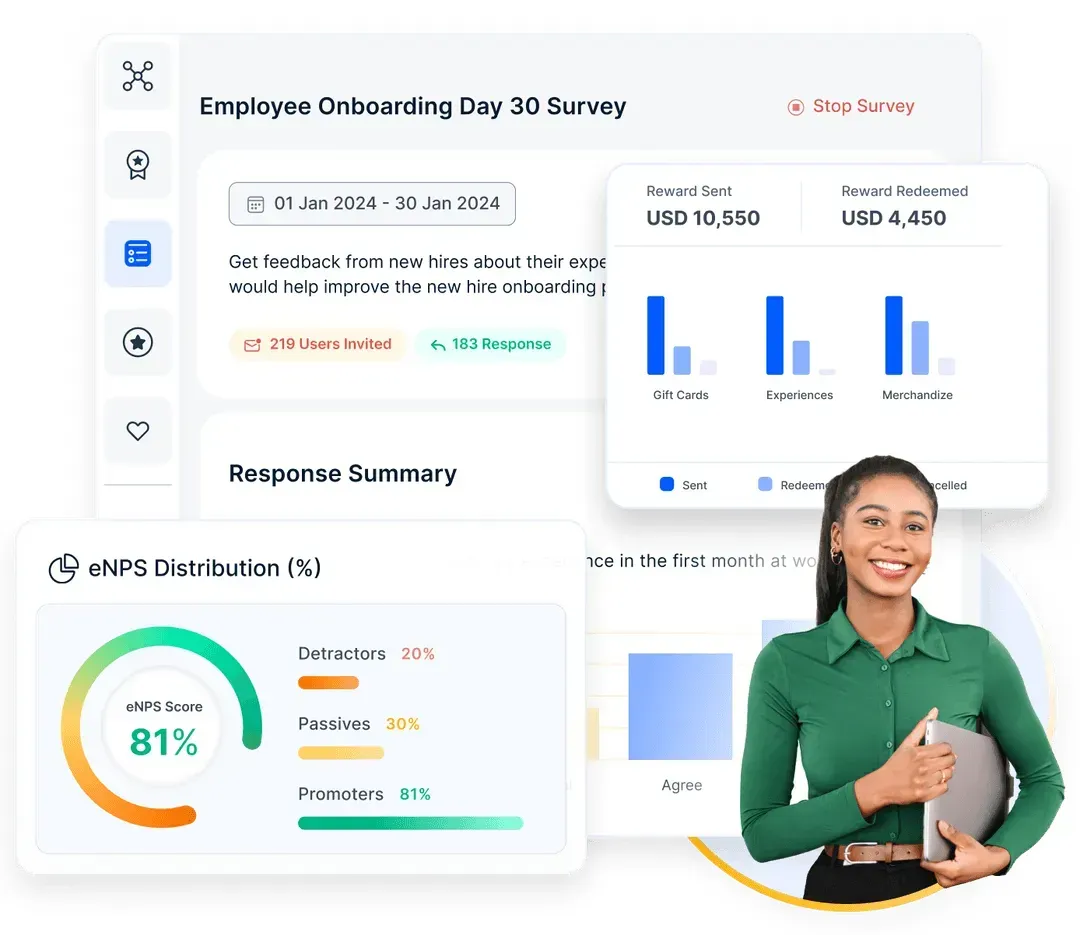
Use Community & Onboarding Groups:
- Include values during onboarding via interactive content and welcome groups.
- Create onboarding quizzes and videos focused on your organization’s cultural values.
Example: A DEI-focused onboarding group introduces new hires to the inclusive practices at your company.
7. Maintain consistency with ai-driven automation
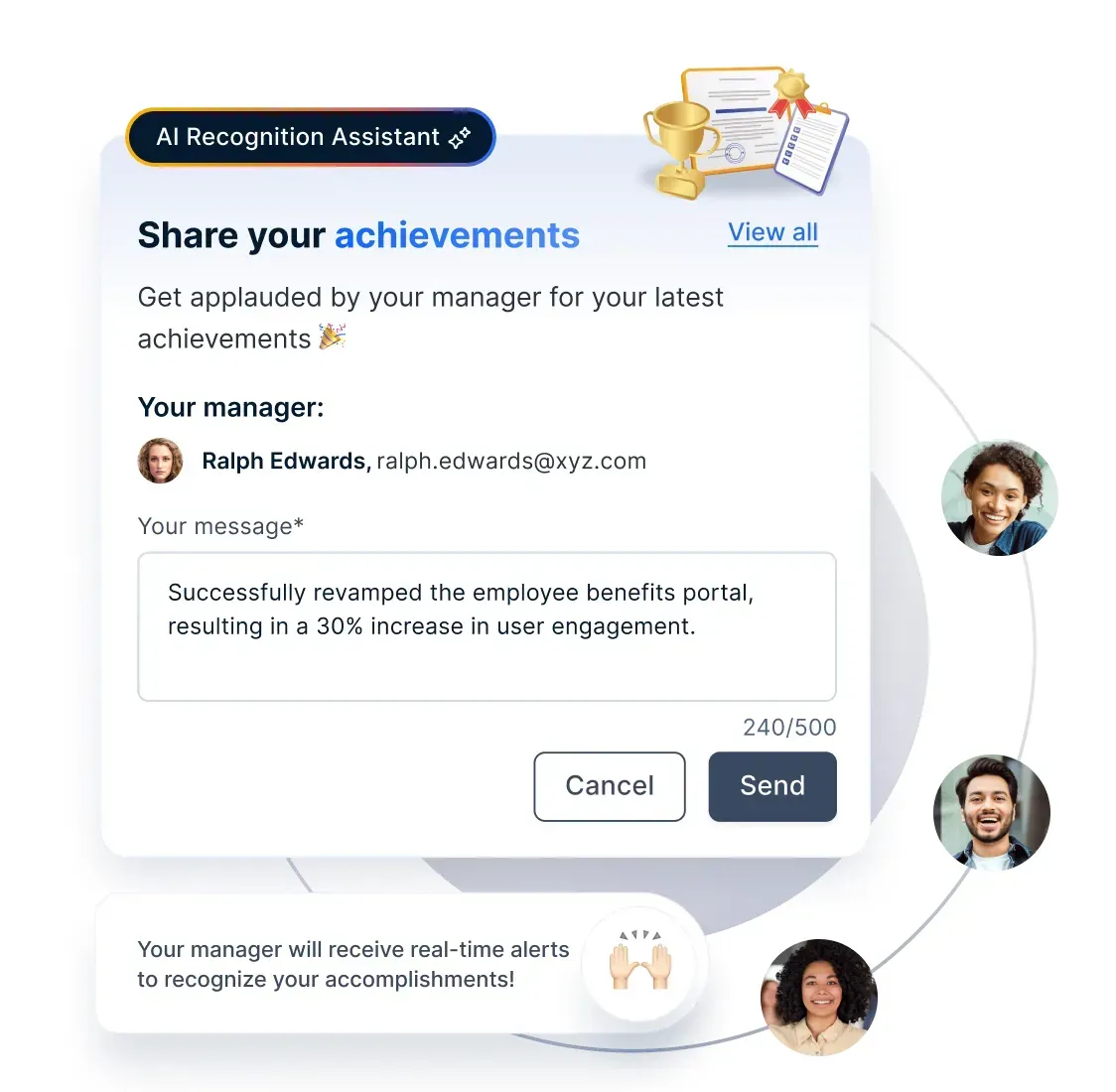
Let Em, the AI Bot, Help You:
- Automate reminders and celebrations so values are continuously reinforced.
- Monitor and moderate content for respectful communication.
- Provide AI-powered insights on value adoption trends by department or demographic.
Integrating core values isn’t a one-time effort—it’s a continuous journey. With Empuls, you have all the tools needed to operationalize values, build a connected culture, and foster accountability across the board. Schedule a call now!
Conclusion: Embracing core values for a thriving workplace
Incorporating core values in the workplace is essential for creating a thriving organizational culture where employees feel valued, engaged, and connected. By identifying and implementing meaningful values, organizations can foster an environment that promotes collaboration, innovation, and accountability.
FAQ's
1. What are your 5 core values?
While I don’t have personal values, organizations often choose values like integrity, respect, collaboration, innovation, and excellence to guide their culture and decision-making.
2. What is core value in the workplace?
Core values in the workplace are fundamental beliefs that guide behavior, shape company culture, and influence decision-making, helping employees understand what is expected of them.
3. What are the top 3 core values?
The top three core values often include integrity, accountability, and respect. These values create a strong foundation for trust and collaboration within an organization.
4. What are some examples of strong values at work?
Examples of strong values at work include teamwork, transparency, inclusivity, and customer focus. These values help foster a positive work environment and drive employee engagement.
5. How do I identify my core values?
To identify your core values, reflect on what matters most to you personally and professionally, consider experiences that shaped your beliefs, and write down the values that resonate with you.
6. How to write core values examples?
To write examples of core values, first list the values important to your organization, then define each with a clear statement and provide specific behaviors that exemplify those values in action.
7. What are the top 10 work ethics?
The top 10 work ethics include punctuality, responsibility, professionalism, teamwork, communication, integrity, adaptability, accountability, respect, and a strong work ethic. These principles promote a positive and productive workplace.


















